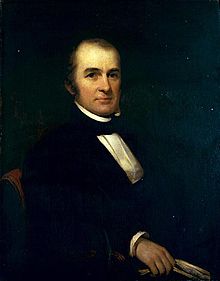George Edmund Badger
| George Badger | |
|---|---|
 |
|
|
United States Senator from North Carolina |
|
|
In office November 25, 1846 – March 3, 1855 |
|
| Preceded by | William Haywood |
| Succeeded by | Asa Biggs |
| 12th United States Secretary of the Navy | |
|
In office March 6, 1841 – September 11, 1841 |
|
| President |
William Henry Harrison John Tyler |
| Preceded by | James Paulding |
| Succeeded by | Abel Upshur |
| Member of the North Carolina House of Representatives | |
|
In office 1816 |
|
| Personal details | |
| Born |
April 17, 1795 New Bern, North Carolina, U.S. |
| Died | May 11, 1866 (aged 71) Raleigh, North Carolina, U.S. |
| Political party | Whig |
| Spouse(s) | Rebecca Turner (1818–1824) Mary Polk (1826–1834) Delia Haywood Williams (1836–1866) |
| Alma mater | Yale University |
George Edmund Badger (April 17, 1795 – May 11, 1866) was a Whig U.S. senator from the state of North Carolina.
Badger was born on April 17, 1795 in New Bern, North Carolina. Following a partial college education at Yale College, he studied law and was admitted to the bar in 1814.
Badger practiced law in North Carolina, was active in state politics, and served as a state superior court judge. A supporter of Andrew Jackson from the 1820s, he separated with him in the mid-1830s, became a leader of the Whig party and helped carry the Whigs to victory in the 1840 Presidential election.
Upon taking office, President William Henry Harrison appointed Badger as his Secretary of the Navy, and he continued in that post for a few months (until September 1841, when he resigned to resume private practice) when John Tyler succeeded to the Presidency upon Harrison's death (April 1841). Badger's brief term as Secretary was marked by efforts to strengthen the Navy in the face of tension with Great Britain, the establishment of the U.S. Home Squadron, and growing interest in steamships.
Badger resigned in September 1841, during a general cabinet shakeup. He was elected to the Senate in 1846 to fill the unexpired term of William Henry Haywood, Jr. and remained a Senator until 1855, after choosing not to run for re-election. He was nominated by President Millard Fillmore as an Associate Justice of the Supreme Court in 1853, but was not confirmed by the Senate (John Archibald Campbell got the position). He was a Unionist during the secession crisis but thereafter supported the Confederate war effort.
...
Wikipedia
